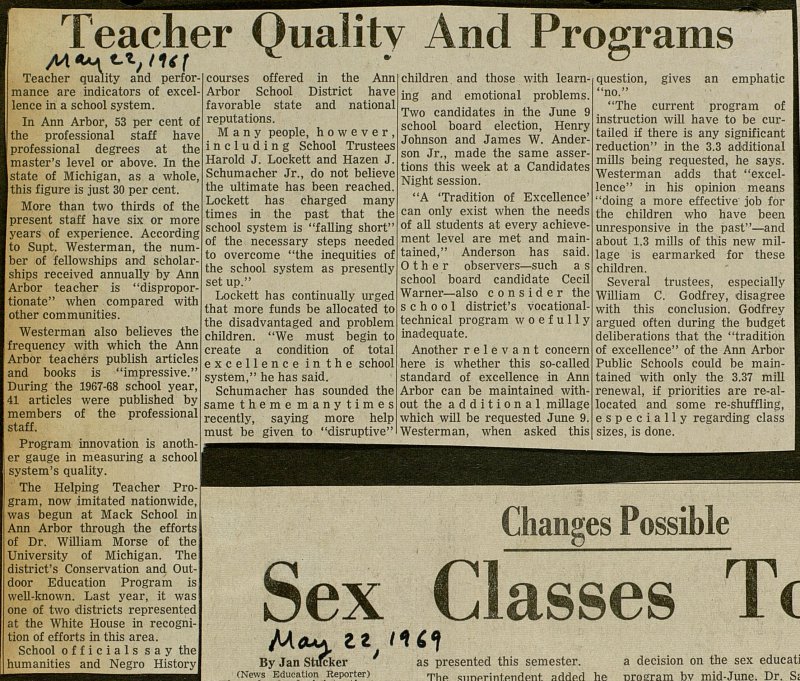Teacher Quality And Programs

Teacher quality and performance are indicators of excellence in a school system. In Ann Arbor, 53 per cent of the professional staff have professional degrees at the master's level or above. In the i state of Michigan, as a whole, [this figure is just 30 per cent. More than two thirds of the present staff have six or more years of experience. According to Supt. Westerman, the number of fellowships and scholarships received annually by Ann Arbor teacher is "disproportionate" when compared with other communities. Westerman also believes the frequency with which the Ann Arbor teachers publish articles and books is "impressive." During the 1967-68 school year, 41 articles were published by members of the professional staff. Program innovation is another gauge in measuring a school system's quality. The Helping Teacher Program, now imitated nationwide, was begun at Mack School in Ann Arbor through the efforts of Dr. William Morse of the University of Michigan. The district's Conservation and Outdoor Education Program is well-known. Last year, it was one of two districts represented at the White House in recognition of efforts in this area. School officials say the humanities and Negro History courses offered in the Ann Arbor School District have favorable state and national reputations. M a n y people, h o w e v e r , including School Trustees Harold J. Lockett and Hazen J. Schumacher Jr., do not believe the ultímate has been reached. Lockett has charged many times in the past that the school system is "falling short" of the necessary steps needed to overeóme "the inequities of the school system as presently set up." Lockett has continually urged that more funds be allocated to the disadvantaged and problem children. "We must begin to créate a condition of total excellence in the school system," he has said. Schumacher has sounded the same theme many times recently, saying more help must be given to "disruptive" children and those with learning and emotional problems. Two candidates in the June 9 school board election, Henry Johnson and James W. Anderson Jr., made the same assertions this week at a Candidates Night session. "A 'Tradition of Excellence' can only exist when the needs of all students at every achievement level are met and maintained," Anderson has said. O t h e r observers - such a s school board candidate Cecil Warner- also consider the school district's vocationaltechnical program woefully inadequate. Another relevant concern here is whether this so-called standard of excellence in Ann Arbor can be maintained without the additional millage which will be requested June 9. Westerman, when asked this question, gives an emphatic "no." "The current program of instruction will have to be curtailed if there is any significant reduction" in the 3.3 additional milis being requested, he says. Westerman adds that "excellence" in his opinión means "doing a more effective job for the children who have been unresponsive in the past" - and about 1.3 milis of this new millage is earmarked for these children. Several trustees, especially William C. Godfrey, disagree with this conclusión. Godfrey argued often during the budget deliberations that the "tradition of excellence" of the Ann Arbor Public Schools could be maintained with only the 3.37 mili renewal, if priorities are re-allocated and some re-shuffling, especially regarding class sizes, is done.
Article
Subjects
University of Michigan - Faculty & Staff
Helping Teacher Program
Education - Millages
Education
Conservation and Outdoor Education Program
Christian Mack School
Ann Arbor News
Old News
William Morse
William C. Godfrey
W. Scott Westerman Jr.
James W. Anderson Jr.
Henry Johnson
Hazen J. Schumacher Jr.
Harold J. Lockett
Cecil Warner